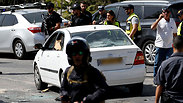
Scene of Sunday's shooting attack in Jerusalem
צילום: רויטרס
Blood of the dead is on the terrorist’s hands
Op-ed: MK Glick was wrong to blame a Jerusalem judge for Sunday's deadly shooting attack, but there is one thing he is right about – judges can be criticized.
This is the order of things: It began when Jerusalem District Court Judge Hagit Mak-Kalmanovith exercised rare tolerance towards a person charged with hostile activity and agreed to accept a plea bargain and postpone his jail sentence by four months.
On the day the culprit was supposed to start serving his sentence and report to the Ramla prison, he carried out a terror attack in Jerusalem, murdering Levana Malichi and police officer 1st Sgt. Yosef Kirma by gunshots. From a person convicted of incitement to violence—offenses which he served one year in prison for—and violating a restraining order, he turned into a terrorist from Silwan at the mercy of Judge Mak-Kalmanovith.

MK Yehuda Glick and Judge Hagit Mak-Kalmanovith. If there was any clemency, it seems much more like negligence (Photos: AFP, Courts website) (צילום: אתר בתי המשפט, AFP)
When that was revealed, Knesset Member Yehuda Glick of the Temple Mount Faithful movement, wrote an angry Facebook post in which he exposed his personal exchange of words with that same judge—who had ordered him to stay away from the Temple Mount, although he claims he committed no offense—and concluded by stating that the blood of the dead is on the judge’s hands.
The judge herself declined to comment. The Courts Directorate responded to the post harshly. Justice Minister Ayelet Shaked, who refused to condemn Glick, asked him to remove the post, and he agreed. Then the judge’s father entered the picture by writing a post in which he referred to Glick as an “unworthy son.” Glick responded by writing that he was willing to argue the facts with him, but would not respond to defamation. In the meantime, of course, it was reported that the security around the judge had been tightened.
And this is what can be concluded and said about the affair: A review of Israeli courts’ verdicts suggests that they cannot be suspected of practicing leniency towards people suspected of security-related offenses and hostile activity. On the contrary: Unfortunately, if there was any clemency, it seems much more like negligence in retrospect, a failure which the State Prosecutor’s Office was involved in too.
A person who sat in jail for a year over incitement, whose Facebook page continuously promoted hatred and enmity, who clashed with police officers at the entrance to the Temple Mount, ignoring a restraining order and calling them “sons of bitches,” is not exactly the right defendant to enjoy the court’s mercy, plea bargains and a delay in the implementation of his sentence, even if his lawyer’s arguments were skillfully worded.
All this does not permit and does not justify Glick’s blatant statement, which determined that the blood of the dead is on the judge’s hands. Even if we will never be able to know for sure, it is very likely that the terrorist from Silwan would have carried out such an attack or a similar one according to a different timetable, and so the blood of the dead is on the murderer’s hands.
Let’s look at the situation on Israel’s roads. Police enforcement on the roads is insufficient, the State Prosecutor’s Offices is in a hurry to reach plea bargains with hazardous drivers, deals which are particularly outrageous at times, and the courts approve them, sometimes by slightly bending the rules in favor of the protocol, but without engaging in any real action to change the situation. Is the blood of the dead on their hands in these cases too?
This entire affair is afflicted with negligence on the one hand and exaggerated reactions on the other hand, which justifies a more thorough examination of the chain of events. Even if the blood of the dead is not on the judge’s hands, that does not mean it is unnecessary to look into the decision making of the judge and of the State Prosecutor’s Office. There is at least one thing Glick is right about: Judges are not free of mistakes, and they can be criticized, even sharply, and even if the Courts Directorate does not approve.










